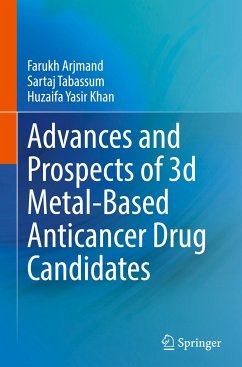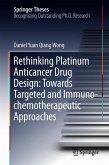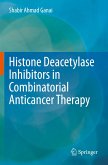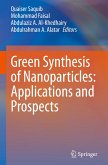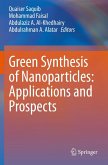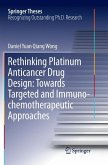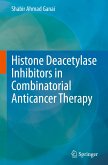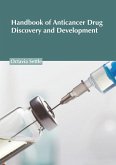Farukh Arjmand, Sartaj Tabassum, Huzaifa Yasir Khan
Advances and Prospects of 3-d Metal-Based Anticancer Drug Candidates
Farukh Arjmand, Sartaj Tabassum, Huzaifa Yasir Khan
Advances and Prospects of 3-d Metal-Based Anticancer Drug Candidates
- Gebundenes Buch
- Merkliste
- Auf die Merkliste
- Bewerten Bewerten
- Teilen
- Produkt teilen
- Produkterinnerung
- Produkterinnerung
This book reviews the potential of metallodrugs against different cancer. It summarizes the classification of metal-based anti-cancer drugs, their plausible biochemical and mechanistic pathways, combining drug strategies for hitting multiple therapeutic targets at the intracellular level, and advanced drug delivery strategies. The book covers the metallodrugs for the efficacious treatment of diverse cancerous strains and recent advances in drug delivery strategies that are used for developing these metal-based therapeutics as potent anticancer agents in vitro and in vivo. The book also covers…mehr
Andere Kunden interessierten sich auch für
![Rethinking Platinum Anticancer Drug Design: Towards Targeted and Immuno-chemotherapeutic Approaches Rethinking Platinum Anticancer Drug Design: Towards Targeted and Immuno-chemotherapeutic Approaches]() Daniel Yuan Qiang WongRethinking Platinum Anticancer Drug Design: Towards Targeted and Immuno-chemotherapeutic Approaches90,99 €
Daniel Yuan Qiang WongRethinking Platinum Anticancer Drug Design: Towards Targeted and Immuno-chemotherapeutic Approaches90,99 €![Histone Deacetylase Inhibitors in Combinatorial Anticancer Therapy Histone Deacetylase Inhibitors in Combinatorial Anticancer Therapy]() Shabir Ahmad GanaiHistone Deacetylase Inhibitors in Combinatorial Anticancer Therapy112,99 €
Shabir Ahmad GanaiHistone Deacetylase Inhibitors in Combinatorial Anticancer Therapy112,99 €![Green Synthesis of Nanoparticles: Applications and Prospects Green Synthesis of Nanoparticles: Applications and Prospects]() Green Synthesis of Nanoparticles: Applications and Prospects171,99 €
Green Synthesis of Nanoparticles: Applications and Prospects171,99 €![Green Synthesis of Nanoparticles: Applications and Prospects Green Synthesis of Nanoparticles: Applications and Prospects]() Green Synthesis of Nanoparticles: Applications and Prospects171,99 €
Green Synthesis of Nanoparticles: Applications and Prospects171,99 €![Rethinking Platinum Anticancer Drug Design: Towards Targeted and Immuno-chemotherapeutic Approaches Rethinking Platinum Anticancer Drug Design: Towards Targeted and Immuno-chemotherapeutic Approaches]() Daniel Yuan Qiang WongRethinking Platinum Anticancer Drug Design: Towards Targeted and Immuno-chemotherapeutic Approaches90,99 €
Daniel Yuan Qiang WongRethinking Platinum Anticancer Drug Design: Towards Targeted and Immuno-chemotherapeutic Approaches90,99 €![Histone Deacetylase Inhibitors in Combinatorial Anticancer Therapy Histone Deacetylase Inhibitors in Combinatorial Anticancer Therapy]() Shabir Ahmad GanaiHistone Deacetylase Inhibitors in Combinatorial Anticancer Therapy112,99 €
Shabir Ahmad GanaiHistone Deacetylase Inhibitors in Combinatorial Anticancer Therapy112,99 €![Handbook of Anticancer Drug Discovery and Development Handbook of Anticancer Drug Discovery and Development]() Handbook of Anticancer Drug Discovery and Development149,99 €
Handbook of Anticancer Drug Discovery and Development149,99 €-
-
-
This book reviews the potential of metallodrugs against different cancer. It summarizes the classification of metal-based anti-cancer drugs, their plausible biochemical and mechanistic pathways, combining drug strategies for hitting multiple therapeutic targets at the intracellular level, and advanced drug delivery strategies. The book covers the metallodrugs for the efficacious treatment of diverse cancerous strains and recent advances in drug delivery strategies that are used for developing these metal-based therapeutics as potent anticancer agents in vitro and in vivo. The book also covers different biophysical and analytical techniques for studying metal-ligand and metal-macromolecular interactions. The book further presents the recent examples of metallomics studies on the different types of cell death induced by metal-based anticancer drugs, especially on the three major forms of programmed cell death (PCD) in mammalian cells: apoptosis, autophagy, and regulated necrosis, alsocalled necroptosis. Lastly, the book explores the modulation of reactive oxygen species (ROS) by metallodrugs.
Produktdetails
- Produktdetails
- Verlag: Springer / Springer Nature Singapore / Springer, Berlin
- Artikelnr. des Verlages: 978-981-97-0145-2
- 2024
- Seitenzahl: 296
- Erscheinungstermin: 3. Mai 2024
- Englisch
- Abmessung: 241mm x 160mm x 22mm
- Gewicht: 555g
- ISBN-13: 9789819701452
- ISBN-10: 9819701457
- Artikelnr.: 69692696
- Herstellerkennzeichnung Die Herstellerinformationen sind derzeit nicht verfügbar.
- Verlag: Springer / Springer Nature Singapore / Springer, Berlin
- Artikelnr. des Verlages: 978-981-97-0145-2
- 2024
- Seitenzahl: 296
- Erscheinungstermin: 3. Mai 2024
- Englisch
- Abmessung: 241mm x 160mm x 22mm
- Gewicht: 555g
- ISBN-13: 9789819701452
- ISBN-10: 9819701457
- Artikelnr.: 69692696
- Herstellerkennzeichnung Die Herstellerinformationen sind derzeit nicht verfügbar.
Prof. Farukh Arjmand is currently working as a Professor of Chemistry at Aligarh Muslim University, Aligarh, India. Prof. Arjmand has 29 years of research and teaching experience in the area of Inorganic Chemistry, in particular, "Medicinal Inorganic Chemistry". She is working on the Molecular design and synthesis of new metallodrug antitumor therapeutic candidates derived from bioactive ligand scaffolds with 3d transition and organotin(IV) metal ions. Her research group has isolated many promising tailored metallodrugs, and antitumor candidates, their structure elucidation was done by spectroscopic and single X-ray crystal diffraction methods, and their potential to act as anticancer chemotherapeutic agents were validated by DNA/RNA binding affinity, cleavage activity and cytotoxicity profile against a panel of human cancer cell lines and molecular docking experiments. She has published 185 research papers in journals of international repute ( with highest impact 24.83) and, contributed many articles to national/international conferences and symposiums, delivered many invited lectures and has two patents on metallic antitumor drug entities. Dr. Arjmand has 5250 citations (Scopus) to her credit with h-index 41 and i10-index 115. Prof. Arjmand has successfully guided 18 Ph.D.'s., 4 M.Phil.'s and 15 Master's project students and has run six major research projects as Principal investigator (PI) on the design of metal-based drug candidates awarded by UGC, CSIR, and DBT, Govt. of India, and has visited many countries (China, USA, Egypt) for academic pursuits. Shehas joint research collaborations with national and international research institutes, IIT Kharagpur, IICT, Hyderabad and ACTREC, Mumbai, India, USTC, China and Institut de Physique de Rennes, France, and The Ohio State University, USA. Prof Arjmand has received many prestigious awards viz., Young Scientist, ICC,2005, the Distinguished Women Scientist Award 2016 , ISCB , 2017, and the CRSI Bronze Medal 2019, Chemical Research Society of India, CRSI) and Outstanding Researchers Award 2022 in faculty of Science and Life science, A.M.U . Prof Arjmand was awarded prestigious FRSC in 2023 ( Membership number: 679931) by Royal Society of Chemistry, UK for her contribution to chemical science and chosen as CRSI council member in 2020 for three years . Prof Arjmand is presently serving as Co-director of APJ Abdul Kalam STEM Center for Education and Research - a collaboration of The Ohio State University, USA, and AMU, Aligarh. She completed the Academic leadership (LeAP) program, MHRD, Govt. of India at AMU, India, and OSU, USA in 2019. 2Prof. Sartaj Tabassum is working as a Professor in the Department of Chemistry, Aligarh Muslim University, Aligarh. He was appointed as a lecturer in the department of chemistry, Aligarh Muslim University, in 1993. He has published 170 papers, in the journals of international repute and has 4184 citations and an h-index is 37(Scopus). He has presented his research work and delivered invited lectures at various conferences/symposia. He is a life member of ICC, CRSI, ISCB, DNA Society of India, and American Nano Society. He has successfully guided 19 Ph.D. and 4 M.Phil students and many Master's projects. He has successfully completed many research projects granted by TWAS, Italy, CSIR, New Delhi, DBT, Govt. of India. As a distinguished Scientist, Prof. Tabassum was awarded the Overseas Associateship award in 2005 by DBT, Govt of India and Prof. W. U. Malik Memorial Award 2022 by Indian council of Chemists ,(ICC).He has signed several MoU and joint research collaborati6ns with the University of Camerino UNICAM, Italy, USM Malaysia, and USTC Hefei, China. He has visited many countries for academic pursuit China, the USA, Italy, and King Saud University, Riyad, Saudi Arabia as a fellow, visiting professor, and for international conferences. Prof. Tabassum is working in the area of medicinal inorganic chemistry and his main focus is the design and synthesis of heterobimetallic complexes that have the potential to act as cancer chemotherapeutics. Three patents have been granted in India ( 01 ) and the US ( 02) in which he has claimed that the new drug will be very effective with minimal side effects and it will be available at a meagre cost. Dr. Huzaifa Yasir Khan received his B.Sc (Hons.) degree in Chemistry from Department of Chemistry, Aligarh Muslim University in 2013 and Master's degree in Chemistry from the Department of Chemistry, AMU in 2015. He was awarded prestigious DST INSPIRE Scholarship from Department of Science and Technology, Government of India for five years during his undergraduate and master's programme. He completed his Ph.D. degree in 2021 under the supervision of Prof. Farukh Arjmand, Department of Chemistry, AMU on the topic "Synthesis and Characterization of tailored metal-based potential antitumor chemotherapeutic drug candidates". He was awarded 'INSPIRE Fellowship' (DST-JRF)' and 'DST INSPIRE-Senior Research Fellowship' by Department of Science and Technology, Government of India during 2015-2020. He has published several good papers in the reputed peer-reviewed journals, viz; Coordination Chemistry Reviews, Chemistry Select, RSC Advances, Bioorganic Chemistry, Polyhedron, ACS Omega etc. and participated in several national and international conferences. He is a life time member of CRSI, India (Chemical Research Society of India) and was a member of ACS, American Chemical society in the year 2019. He has been awarded Young Scientist for the best oral presentation by Indian Council of Chemists in the year 2022. Following his Ph.D., Dr Huzaifa Y. Khan worked as Postdoctoral Research Associate at Interdisciplinary Biotechnology unit, Aligarh Muslim University, Aligarh funded by Indian Council of Medical Research, New Delhi, India for one year. He is currently working as Assistant Professor (Contractual) in the Department of Chemistry, A.M.U. Aligarh.
1. Introduction.- 2. Classification of Metal-Based Anticancer Chemotherapeutic Agents.- 3. Interaction Studies of Metal-Based Anticancer Drug Entities with Potential Therapeutic Targets.- 4. Biophysical and Spectroscopic Techniques to Validate the Interaction with Therapeutic targets.- 5. DNA Condensation Processes mediated by Metal-based Drug Entities and Morphological Studies.- 6. Molecular Docking and Computational in silico Investigations of Metal-Based Drug Agents.- 7.Biochemical Mechanistic Pathway of Cell Death Induced by Metal-Based Chemotherapeutic Agents.- 8.Combination Drug Strategies for Targeting Specific Biochemical Pathways for Superior Therapeutic Potency.- 9. Advanced Drug Delivery Strategies for Metal-Based Anticancer Drugs.- 10. Endoplasmic Reticulum(ER) Targeted Metal-Based Anticancer Chemotherapeutic Agents.- 11.Progress and Future Projections in Metal-Based Polymeric Anticancer Compounds.- 12. Conclusions.
1. Introduction.- 2. Classification of Metal-Based Anticancer Chemotherapeutic Agents.- 3. Interaction Studies of Metal-Based Anticancer Drug Entities with Potential Therapeutic Targets.- 4. Biophysical and Spectroscopic Techniques to Validate the Interaction with Therapeutic targets.- 5. DNA Condensation Processes mediated by Metal-based Drug Entities and Morphological Studies.- 6. Molecular Docking and Computational in silico Investigations of Metal-Based Drug Agents.- 7.Biochemical Mechanistic Pathway of Cell Death Induced by Metal-Based Chemotherapeutic Agents.- 8.Combination Drug Strategies for Targeting Specific Biochemical Pathways for Superior Therapeutic Potency.- 9. Advanced Drug Delivery Strategies for Metal-Based Anticancer Drugs.- 10. Endoplasmic Reticulum(ER) Targeted Metal-Based Anticancer Chemotherapeutic Agents.- 11.Progress and Future Projections in Metal-Based Polymeric Anticancer Compounds.- 12. Conclusions.

